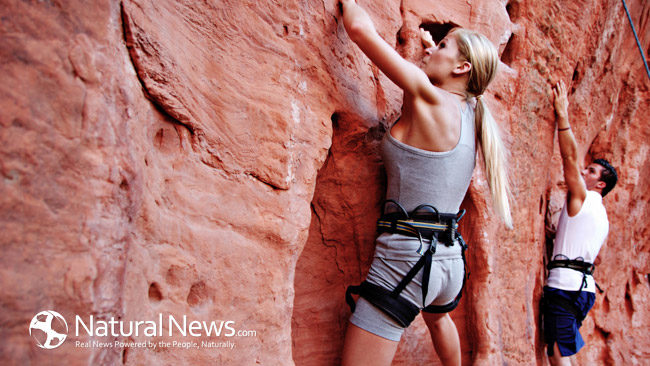Climbing up the side of a large cliff or rock takes a considerable amount of physical endurance and overall strength. Although rock climbing is fun, it’s a physically demanding sport that also requires a great deal of mental focus as well. It’s an activity that not only tests your mental skills, but obviously challenges your balance, agility, stamina, and sheer physical aptitude.
In addition to the valuable time spent outdoors surrounded by spectacular views and probably many types of wildlife, climbing rocks affects literally every aspect of your being, including your mind, body, and spirit. Here are 7 surprising health benefits of rock climbing.
1. Tones and Strengthens Target Muscle Groups
Rock climbing engages many of your different muscle groups in order for you to reach the summit of a cliff or large boulder. Virtually every area of the body is involved, including your calves, quads, abs, biceps, deltoids, and oblique. According to experts, rock climbing enthusiasts typically have much lower BMIs (body mass indexes), enhanced handgrip strengths, and significantly less body fat since virtually every muscle are called for duty during just one rock climbing session.
2. Combines Both Muscle Strength and Cardio
In only one rock climbing expedition, the body must perform a variety of physically demanding tests and skills, including developing endurance, building muscle, and optimizing heart rate. It generally takes a great deal of upper body strength to climb rocks since your body is constantly being pulled up, while your core and legs are strengthened as your body struggles to find a sense of balance and stability. Based on the findings of sports medicine experts, the amount of energy and cardio required to climb rocks is similar to someone jogging at a steady pace of around 10 minutes a mile.
3. Decreases Stress Levels
A neurotransmitter known as norepinephrine automatically increases as you rock climb, which in turn reduces stress and enables your body to feel more relaxed in spite of the physical exertion it takes to reach the summit. Rock climbers often find themselves completely immersed in the process of repetitive reaching, leaping, and climbing in order to achieve the feeling of utter ecstasy and bliss. Outdoor rock climbing also provides the key benefits of increased exposure to the sun, therefore increasing the levels of essential Vitamin D as well.
4. Enhances Flexibility, Agility, and Dexterity
Climbing up the side of a colossal-sized rock will naturally enhance your range of motion, including your flexibility and dexterity. It takes quick-thinking skills and a certain level of agility to climb on footholds and handholds that are often far apart and uncomfortable to maneuver. Rock climbers need to constantly stretch their bodies in order to improve their blood circulation as well as their range of motion to achieve their goals.
5. Helps Prevent Certain Illnesses and Chronic Diseases
Because virtually every aspect of the body is optimized to its fullest potential among avid rock climbers, many harmful chronic diseases and disorders can be prevented, including diabetes, high blood pressure, and heart disease. Rock climbing is considered an intensely physical sport and therefore has the ability to reduce stress, build muscle, increase cardio, and significantly lessen the risk for a number of illnesses, according to the CDC (Centers for Disease Control and Prevention).
6. Aids in Burning Calories
Rock climbing is the ideal activity for burning calories. While ascending a cliff, the average 150 lb. person can burn more than 800 calories per hour and just under 600 calories an hour while descending, or rappelling.
7. Improves Mental Strength
Most people don’t realize just how much mental thought, focus, and problem-solving skills are required for rock climbing. Traversing difficult routes demands that you not only assess your own physical strength and prowess, but the ability to plan each step along the way while maintaining a certain level of energy. Also, it takes good hand-eye coordination to climb rocks and to learn how to keep your mind and body working in perfect unison in order to succeed.
Also, statistics show that performing regular physical activity of virtually any kind helps with depression and mood disorders. Many researchers believe that staying active can greatly help improve your general well-being since it naturally boosts your self-esteem and the confidence required to engage in other challenges in life.
Anyone seeking a physical, mental, and truly spiritual experience should consider taking up the sport of rock climbing since it addresses each of these aspects. It’s something that will not only keep you in top physical shape and mental clarity, but it’s fun and uplifting as well. While no rock climber is a stranger to conquering a variety of both personal and professional challenges in life, there’s a reason why they typically appear on all those inspiring motivational posters everywhere you look.
Sources:
http://www.huffingtonpost.com/2014/08/30/health-benefits-rock-climbing_n_5708847.html
http://www.healthguidance.org/entry/15007/1/The-Benefits-of-Rock-Climbing.html
http://www.nhs.uk/Livewell/fitness/Pages/rock-climbing-health-benefits.aspx
http://www.truenorthathletics.com/yoga-for-rock-climbers/
http://www.livestrong.com/article/467023-is-rock-climbing-a-good-cardio-workout/
http://www.healthfitnessrevolution.com/top-10-health-benefits-rock-climbing/
http://climbing.about.com/od/letsgoclimbing/a/WhatisClimbing.htm
http://www.fitday.com/fitness-articles/fitness/exercises/the-exercise-benefits-of-rock-climbing.html
http://www.patheos.com/blogs/standingonmyhead/2015/01/climbing-the-spiritual-el-capitan.html





